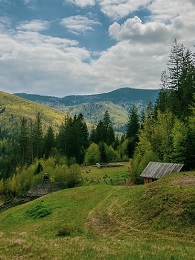As Covid-19 prowls the streets and venues of Michigan, my wife Teresa and I are holed up in our house in a quiet neighborhood on the west side of Ann Arbor. We’re safe and healthy and keeping each other good company. She’s been sewing face masks from high-end quilting cotton. They’re durable and multi-colored, each a humble work of art. We’ll be wearing them next time we go, at senior hour, to our grocery store on Stadium Boulevard.

I had a dream a few weeks ago. A hawk was perched on a nearby tree. It saw me, and its eyes instantly glared with predatory fierceness. Suddenly, it was swooping toward me, talons extended. I ducked, yet felt a sharp nick upon my scalp. I awoke with the sense that nature is powerful and takes no prisoners. With the plague upon us, have our thick skulls been given notice? Does human nature need to get in sync with the natural world?
We’re all solemn about what’s happening. Who could be numb to it? Yet I don’t want to feel overwhelmed—and certainly not fearful. I’m determined not to suffer unnecessarily. Anxiety and fear do no one any good. Whenever an anxious thought arises, I reflect on the courage and compassion of our medical workers and hospital staff. Their bravery displays the essential goodness of humanity. They’re exemplars of our worthiness.
At the grocery store, the workers carry on with steadfast dignity. I see them with more respect than ever. These times must be awakening our discernment, for I also notice how precious each one is. Can they feel this truth in themselves? I hope so.
I bathe myself in the goodness of all essential workers who are now facing danger. A shout-out to the police, firemen, utility workers, and journalists, all steady at their posts. I breathe in their bravery, and doing so helps me support myself emotionally. Isn’t our goodness, more so than government checks, the grace that will save us and help us to recover when the virus goes away?
Teresa and I are cheerful with each other. We’re simultaneously cheerful, solemn, sad, and anxious, two old-timers spinning on our balance beam. Gratitude mingles with sorrow, compassion melds in mourning, acceptance winks at dying. How strong can I be? The fortitude I feel arises, too, from whatever goodness I can connect with in myself. Kind thoughts I have for others enhance inner peace. As we pass on the sidewalks, keeping social distance, my neighbors are more open and friendly than ever.
It’s normal now to think of death. How brave would I be gasping for breath, my airways swollen and lungs filled with fluid? Such images from the daily news now haunt us, along with reflections on the shortage of ventilators. I’m not afraid of dying, but I don’t want to go out that way. Perhaps the living Earth can’t breathe either. Too much pollution. The Gaia principle, put forward in the 1970s by the chemist James Lovelock, theorizes that the Earth is a complex, self-regulating system with a hidden intelligence, capable of preserving a homeostatic balance and optimal conditions for all of life. In other words, the Earth has a countervailing immunity to what would destroy it. Guess who the destroyers might be? Tit-for-tat. Nothing else has gotten through to us.
While the Gaia principle was first received with hostility by many scientists, it is now studied, as this Harvard University paper informs, in the discipline of Earth system science. Some of its principles have been adopted in fields like biogeochemistry and systems ecology.
I’m not claiming the Gaia principle is true. It just feels like it could be true. Why? Because it so perfectly humbles human vanity. It makes us mere earthlings—like dogs, cows, and sparrows—who happen to have a bit more brain power. If so, we’re not Americans, Chinese, Russians, and Indians so much as earthlings united by common DNA, deficiencies of immunity, an aversion for truth, and an appetite for conflict. It wouldn’t surprise me that, like other animals, we’re less conscious than are the planet’s integrated systems.
Vanity is a part of us. It’s in the resistance we all unwittingly produce to shield ourselves from the knowledge that reveals the inner dynamics of self-sabotage. This knowledge exposes our psyche’s unconscious willingness to replay and recycle inner conflict with all its negative repercussions and profusions of stupidity. A conglomeration of stupidity has become a collective calamity, a march of folly reaching critical mass. One of these stupidities is greed, another is lust for power and attention, another is indifference to one’s carbon footprint.
The Earth, adorning a crown of enlightened rule symbolized by a corona-virus, informs us, in terms we finally can understand, of our place as subjects of a system much more profound and elegant than our revered machines, lifestyles, and economies.
